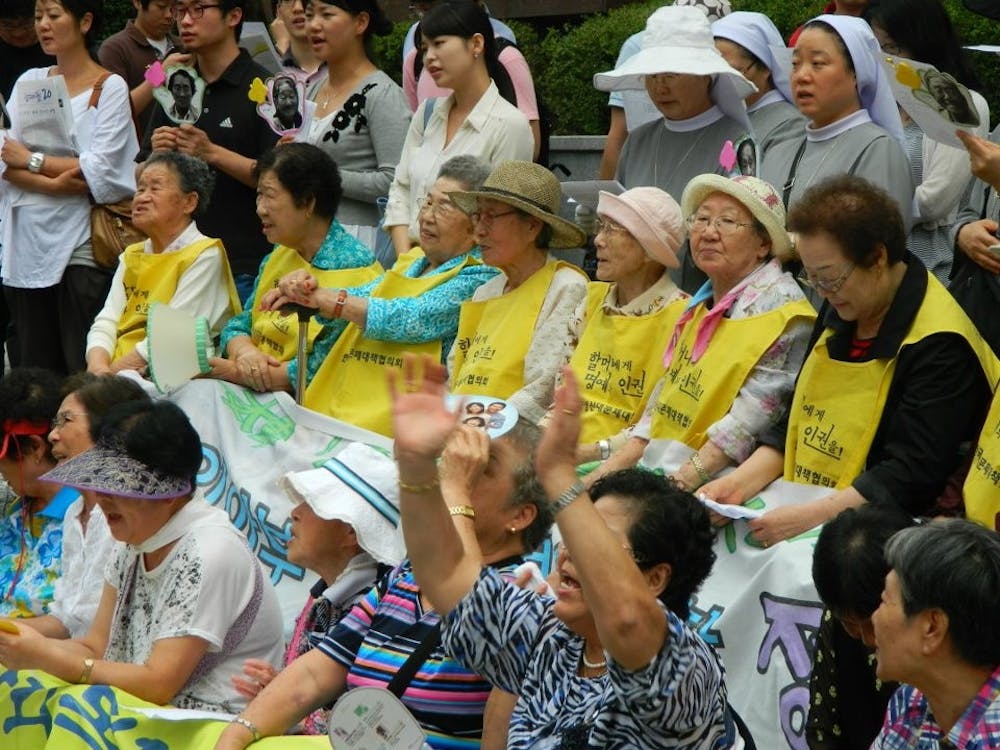A website that discusses controversial issues in twentieth-century Japanese history from a right-wing perspective has called itself the Princeton Institute for Asian Studies (IFAS) and presented its website in an orange-and-black color scheme, despite being unaffiliated with the University.
According to the website’s homepage, the Princeton IFAS aims to provide a “[c]ompilation of relevant books previously available only in Japanese or in Japan to express counter perspectives to the prevailing issues, to help those who cannot read Japanese, who has [sic] limited ability to obtain and digest these resources.”
A statement appearing in the website’s footer reads, “Princeton IFAS is NOT affiliated with Princeton University.”
Run by Koichi Mera, the website of the Princeton IFAS provides links to additional resources that advance conservative interpretations of controversial events that occurred before and during the Second World War.
According to Sheldon Garon, the Nissan Professor in Japanese Studies and a professor of History and East Asian Studies, who specializes in modern Japanese history, the website includes “brazen attempts to, in this case, take the Princeton name” and leverage it in a “kind of a worldwide campaign,” which seeks to “in their terms, spread the word that Japan has really nothing to apologize for, that it wasn’t doing anything differently in imperialism in the Second World War than other powers were doing.”
Garon believes that sites like these are “linked to the very top reaches of Japanese conservative leadership” and try to present, particularly to English-speakers and people in the United States, a pro-Japanese version of history in response to what is perceived as Korean or Chinese propaganda against Japan.
Among the issues featured on the website is the Nanjing Massacre — a campaign of mass murder, mass rape, and destruction perpetrated by Japanese imperial troops against civilians and soldiers in Nanjing, China, in late 1937 and early 1938. To this day, the death toll remains contested, although most historians estimate that hundreds of thousands of people were killed. In addition, the site discusses the status of so-called “comfort women,” women and girls forced into prostitution by the Japanese military before and during World War II.
Over the past decade, statues of comfort women have been erected throughout the world to memorialize their suffering.

“It’s bad enough being a prostitute, but being a prostitute in a battlefield when you’re losing is particularly bad, so they suffered in lots of ways,” Garon said. “These are the women who, depending on your account, were either forced into prostitution, recruited, volunteered.”
While some were willing, others were coerced into sex work, Garon said. The politicization of the issue in both Japan and South Korea, he added, has caused people to hold “black-and-white positions” on the matter.
“It’s about historical memory,” he said. “It’s about bad things the Japanese did. But it’s also about how governments on all sides are manipulating the memory, too.”
Garon has been in contact with Mera, the creator of the website.

Mera told Garon about IFAS a few months ago, inviting him via email to a panel entitled, “Were Comfort Women Sex-slaves?”
In the email, obtained by The Daily Princetonian, Mera wrote that “the United Nations’ Special Reporter [sic] [Radhika] Coomaraswamy declared they were sex-slaves a long time ago, and this notion is prevalent even today in the U.S.” — but that “in Japan, most people have a different perception.”
When Garon responded, asking to visit IFAS with a number of East Asian Studies professors, Mera wrote back that the Institute “do[es] not have any physical presence” and “is a network of scholars” concerned with Asian issues.
To Garon, one insidious aspect of IFAS is its use of the Princeton name.
“It would be akin to me putting up a site that looks like it’s from the Japanese government and saying that the Japanese government apologizes to Asians for all that they’ve done,” Garon said. “What they’re doing is extremely unethical.”
Mera runs a related website, the Global Alliance for Historical Truth (GAHT), through which he filed a lawsuit in 2014 against Glendale, Calif., in an effort to force the city to remove its memorial dedicated to comfort women. Mera and his co-plaintiffs lost in both state and federal court.
On the GAHT website, Mera announces his intention to send materials espousing his view on the historical use of comfort women, whom he considers to have been willing prostitutes or “professional camp followers,” rather than “sex slaves,” to California school districts.
An announcement on the GAHT website dated June 5 reads (as translated and paraphrased by Garon), “This year, in California, education on the comfort women is just beginning. Chinese- and Korean-Americans are behind this movement to provide to the schools many memoirs — like, testimonials — of women who are said to be former comfort women. In the interest of correcting the historical record, we want to correct it, and we’re going to send our own materials to 1,100 schools, because we’ve got to resist the pressures coming from the Chinese- and Korean-Americans.”
Mera was recently featured in the documentary “Shusenjo: The Main Battleground of the Comfort Women Issue,” a two-hour film by Japanese-American filmmaker Miki Dezaki exploring the history of comfort women. The New York Times reported that five individuals featured in the film are currently suing Dezaki for defamation based upon Dezaki’s characterization of their claims as “revisionist” and influenced by “sexism” and “racism.” Mera has not been mentioned among the plaintiffs.
Mera did not respond to a request for comment by the time of publication.
The University has been informed of the website and, according to Garon, has held meetings to address the matter.
Deputy University Spokesperson Michael Hotchkiss wrote in an email to the Prince, “We have been in contact with the head of this organization and have requested that it make changes to its name and branding to make clear that it is not affiliated with the University. We will continue to pursue this matter.”








